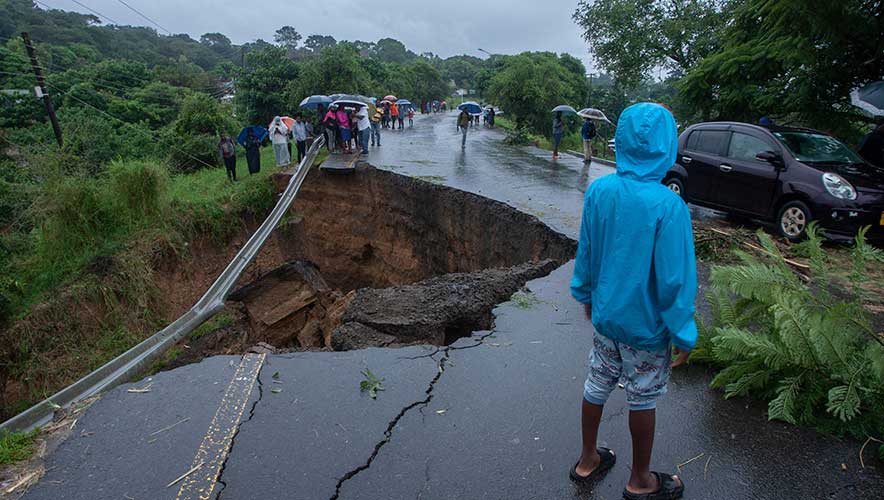Scientists Deliver Dire ‘Final Warning’ on Impending Climate Crisis
“Our world needs climate action on all fronts: everything, everywhere, all at once,” warned United Nations Secretary General António Guterres after the release of the final part of the sixth assessment report from the Intergovernmental Panel on Climate Change (IPCC). The report’s message was clear: act fast on greenhouse gas emissions or risk irrevocable damage worldwide.
The comprehensive climate science review—which contains no new science but synthesizes the body of knowledge on climate change and its impacts, risks, and mitigation measures—noted that the world is likely to miss its most ambitious climate target—limiting global warming to 1.5 degrees Celsius (2.7 degrees Fahrenheit) above preindustrial temperatures within a decade, The Washington Post reported. Beyond that 1.5 degree threshold, climate-triggered disasters—including heat waves, famines, and infectious diseases—will likely become so extreme that people cannot adapt to them, leading to widespread loss of life.
Already, the IPCC showed, Earth’s global average temperature has increased by at least 1.1 degrees Celsius over preindustrial temperatures. Evidence shows that effects are already being felt: dwindling fish populations, less productive farms, rising infectious diseases, and escalating weather disasters, the Post reported. The effects are felt strongest in poorer countries and low-lying island nations.
More than 3.3 billion people currently live in areas that are “highly vulnerable” to climate breakdowns, and half of the world’s population experiences severe water scarcity for at least part of the year, The Guardian reported. Severe weather changes are already driving displacement of people in Africa; Asia; North, Central, and South America; and the south Pacific. Mass migration and displacement often lead to conflict and political instability as well.
“Between 2010 and 2020, human mortality from floods, droughts, and storms was 15 times higher in highly vulnerable regions, compared to regions very low vulnerability,” the IPCC Synthesis Report said. In all regions, increases in extreme heat events resulted in human mortality and morbidity, and the occurrence of climate-related food- or water-borne diseases increased.
“This report is a clarion call to massively fast-track climate efforts by every country and every sector and on every timeframe,” Guterres said.
He demanded that rich countries, including the United States, fulfill their climate commitments earlier than their low-income or developing counterparts. Emerging economies such as China and India (which plan to reach net zero emissions by 2060 and 2070 respectively) must hasten their efforts, Guterres added. He and the IPCC both called for the world to phase out coal, oil, and gas, which make up more than 80 percent of the world’s energy sources and are responsible for more than three-quarters of global greenhouse gas emissions, CNN reported.
The Post reported: “The world already has all the knowledge, tools, and financial resources needed to achieve its climate goals, according to the IPCC. But after decades of disregarding scientific warnings and delaying climate efforts, it adds, humanity’s window for action is rapidly closing.”
The IPCC’s report comes amid multiple climate-related crises, including tropical cyclones that hit areas in the southern hemisphere. Cyclone Gabrielle crashed into New Zealand’s North Island in February, killing 11 people and displacing more than 10,000. The Category 3 storm reached wind speeds of up to 159 km/h (99 mph), destroying homes and leaving people without power, water, or phone signals, BBC News reported. The storm and subsequent flooding kicked off a national debate about how to manage climate-vulnerable homes and areas.
In a speech to the New Zealand Parliament in February, Climate Change Minister James Shaw attributed the scale of the disaster to climate change, saying “there will be people who say it’s too soon to talk about these things… but we are standing in it right now. This is a climate change-related event,” the BBC reported.
In southern Africa, more than 400 people were killed and thousands of homes destroyed due to the month-long storms from Tropical Cyclone Freddy. The tropical system lasted at least 36 days, and it reached Category 5 hurricane wind speeds—in excess of 260 km/h (160 mph). In some areas, rainfall amounts exceeded 24 inches, which led to mudslides and road collapses in some vulnerable areas. The storm hit Mozambique, Malawi, and Madagascar hardest.
While it is difficult to pin the unusual strength and longevity of Cyclone Freddy on climate change, it is well-known that warmer air can hold more water, leading to heavier rainfall during storms, the BBC reported, and stronger, more devastating storms are likely to form as global temperatures rise.
The IPCC synthesis report said that unless nations adopt new environmental policies and rapidly shift away from fossil fuels, global average temperatures could warm by 3.2 degrees Celsius by the end of the century, which would lead to several feet of sea level rise, the extinction of hundreds of species, and mass migration of human populations from places where they can no longer survive.
“Climate change is a threat to human wellbeing and planetary health,” the IPCC report said. “The choices and actions implemented in this decade will have impacts now and for thousands of years.”
While the report sounds a dire warning, it offers a glimmer of hope—the world has the resources and knowledge to confront climate change and meet its 1.5-degree goal if it jumps into action right away, scaling up climate action along six main lines:
- Energy supply. Diversify energy sources (including wind, solar, bioelectricity, and others) for reliability and resilience, and improve water use efficiency.
- Land, water, food. Boost efficient livestock systems, improve cropland management, agroforestry, coastal defense and hardening, and reduce conversion of natural ecosystems, reducing food waste and loss.
- Settlements and infrastructure. Create sustainable urban water and land use management, green infrastructure and services, efficient buildings, biofuels for transportation, onsite renewables, fuel-efficient vehicles, and public transport and bicycling.
- Health. Enhance health services, including nutrition and diets.
- Society, livelihood, and economy. Implement risk spreading and sharing, social safety nets, climate services such as early warning systems, disaster risk management, human migration adaptations, planned resettlement, and livelihood diversification.
- Industry and waste. Begin fuel switching, energy efficiency, material efficiency, reducing methane from waste and wastewater, enhanced recycling, and carbon capture.










